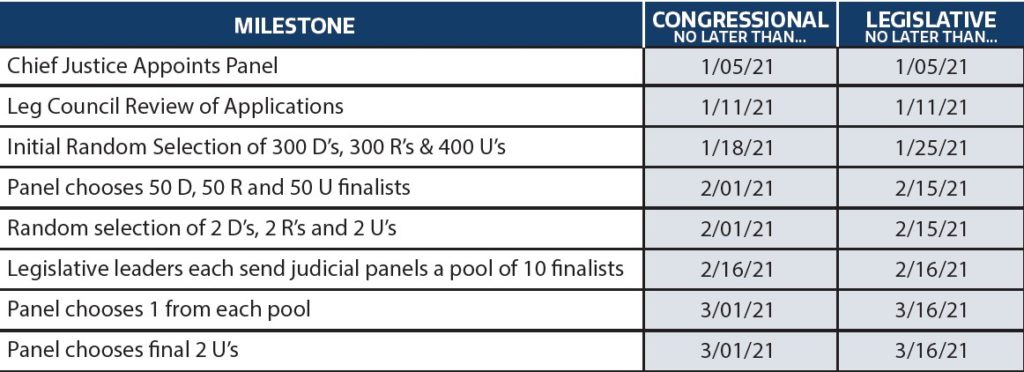Fair and competitive congressional and legislative districts are VITAL to ensuring rural representation across the state’s election process. WE NEED YOU TO APPLY for a seat on one of the 2021 commissions that are redrawing district lines.
Applications can be submitted from early August through November 10. Apply today!
Click here to apply!
What is redistricting?
Every 10 years, after the decennial Census, the U.S. Constitution and United States Supreme Court require states to redraw congressional and legislative districts to equalize population. This process is called redistricting.
What is Gerrymandering?
In practice, the process of redistricting is highly political. Interest groups, such as political parties and incumbent politicians, work behind the scenes to draw districts to their advantage. Often, one party will attempt to “pack” as many of the opposing party’s voters into as few districts as possible to make the surrounding districts more favorable to their own party. This is called gerrymandering. In recent decades, Colorado has increasingly experienced gerrymandering.
2021: A New System
Because of Colorado’s recent history of highly contentious redistricting cycles that too often yielded gerrymandered maps designed to promote the interests of one or the other political party, Colorado voters in 2018 passed Amendments Y and Z to the Colorado constitution. These amendments create
politically balanced commissions – each composed of four Republican, four Democrat and four Unaffliated members – to redraw the maps, using neutral criteria and nonpartisan staff.
FAQs
Q: Who can apply for the commissions?
A: With few exceptions, any Colorado voter who has been registered with the same party – or no party at all – for five consecutive years at the time of the application and who has voted in the two most recent general elections can apply for the commissions. The exceptions?
- Anyone who has been a candidate for federal office in the previous five years cannot serve on the Congressional Redistricting Commission. Anyone who has been a candidate for state legislature in the previous five years cannot serve on the Legislative Redistricting Commission.
- Individuals who have been compensated by a campaign committee advocating for the election of a candidate to U.S. Senate or U.S. House of Representatives in the previous three years cannot serve on the Congressional Redistricting Commission. Individuals who have been compensated by a campaign committee advocating for the election of a candidate to state legislature in the previous three years cannot serve on the Legislative Redistricting Commission.
- Any individual who has been an elected public official at the federal, state, county or municipal level in the previous three years cannot serve on either commission.
- Any individual who has served as an elected political party official above the precinct level or an employee of a political party in the previous three years cannot serve on either commission. Any individual who has been a professional lobbyist — registered to lobby with the state of Colorado, any municipality in Colorado, or at the federal level — in the three previous years cannot serve on either commission.
Q: Can I apply for both commissions?
A: An individual can serve on the Congressional Redistricting Commission or the Legislative Redistricting Commission, but not both. However, there is no prohibition against applying for both commissions.
Q: How and when do I apply for the commissions?
A: Applications for both commissions will be published by Colorado Legislative Council by August 10, 2020. Applications must be returned by November 10, 2020. Colorado Neighborhood Coalition will send you a link to the application when it is published, if you enter your name and email address here. While we do not know the exact content of the application questionnaire at this point, we do know that it will afford applicants an opportunity to state why they want to serve on the commission, describe how they will promote consensus on the commission, and include up to four letters of recommendation.
Q: How and when are the commissioners selected?
A: Appointments to each commission take place in February and March, 2021, through multiple phases. The commissioner selection process includes checks and balances to ensure independents are not agents of the two parties: a rigorous application process, a five-year registration requirement, a panel of three retired judges (no more than one of which is registered with any given party) who must unanimously agree to appointments, and a random selection process. Here are the key dates for development of each commission:

Q: Who chooses the retired judges who oversee the selection of the commission members?
A: The judicial panel consists of the three most recent retirees from the Colorado Supreme Court and the Colorado Court of Appeals, except that no more than one can be a member of any given political party. The panel’s decisions require unanimity.
Q: What qualities will the panel look for in prospective commissioners?
A: The panel will ensure that the commission consists of four Democrats, four Republicans and four unaffiliated voters. It must ensure that each of the state’s seven congressional districts have at least one and no more than two representatives on each commission. The panel will work to ensure that each commission reflects the state’s geographic, racial and ethnic diversity. And in selecting finalists, the panel must look for individuals who (1) have experience organizing, representing, advocating for, adjudicating the interests of, or actively participating in groups, organizations or associations in Colorado, and (2) relevant analytical skills, the ability to be impartial, and the ability to promote consensus on the commissions.
Q: What criteria are used to draw the maps?
A: The commissions are required to comply with the following criteria in drawing maps: Visit: www.ColoradoNeighborhoodCoalition.org for more information.
Q: Who draws the maps?
A: Each commission is composed of 12 members: 4 Democrats, 4 Republicans and 4 Unaffiliated voters. The commission’s maps are drawn by professional, nonpartisan Legislative Council staff. Any Colorado citizen can submit a map for the commission’s consideration.
Q: If I’m selected, what are the commitments of time and resources from me?
A: The time commitment for serving on the commission is substantial. The commission sets its own meeting schedule. In the past, the commission met once every week or two for a period of several months. Most such meetings take place in Denver. However, once the preliminary plan is published, likely in May and June 2021 (subject to alteration, if Census data delivery is delayed) the commission must hold hearings throughout the state. Additionally, Commissioners will want to spend time reviewing public comment and perhaps developing and/or negotiating maps.
Q: If I’m not selected for the commissions, what opportunities exist for public input?
A: Several opportunities exist for public input. The commission will have a website by which citizens can comment on proposed maps or even submit proposed maps. The commission will also hold public hearings throughout the process.
Q: Will COVID-19 affect the redistricting process?
A: The U.S. Census Bureau projects that COVID-19 will delay the delivery of Census data to the states by as much as 90 days. A process that normally would kick off in earnest in March 2021 could therefore be delayed.
Click here to apply!




